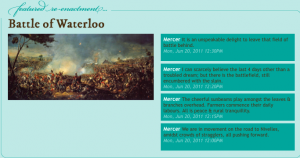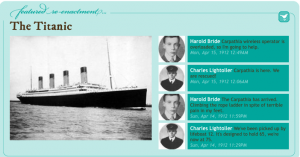From following conferences to collaborative story-writing, there are plenty of exciting ways to use Twitter in school (see this lengthy list, for example).
But here's one more: TwHistory, a new, free tool that encourages teachers and students to dig deep into history, get inside the heads of historical figures, and reenact historical events in real time.
What was the experience of those who fought the Battle of Waterloo? What would they have felt? What would they have feared? What if we could re-experience history as it unfolded?
That's what TwHistory attempts to do. Anyone can follow various historical "reenactments" – from the sinking of the Titanic to the assassination of John F. Kennedy – or sign up for free and create their own. Participants choose a historical event, create Twitter accounts for individual characters, pore over primary source documents and think critically about the times, dates, and durations of events to create hundreds of Tweets as they might have been broadcast had Twitter existed before the 21st century. They then submit all those Tweets to the engineers at TwHistory, specifying a start date for their event, and then watch it unfold – over a day, a week, a month or more – reflecting the event's actual duration.
"When I first got on Twitter, I thought – like a lot of folks did – that this was the biggest waste of time ever," says TwHistory co-founder Marion Jensen. "I didn't see any value to it. Then I found out about hash tags and followed a conference. I almost felt like I was there." He thought, "You could almost tell a story using this... and then I got to thinking: History is full of stories."



